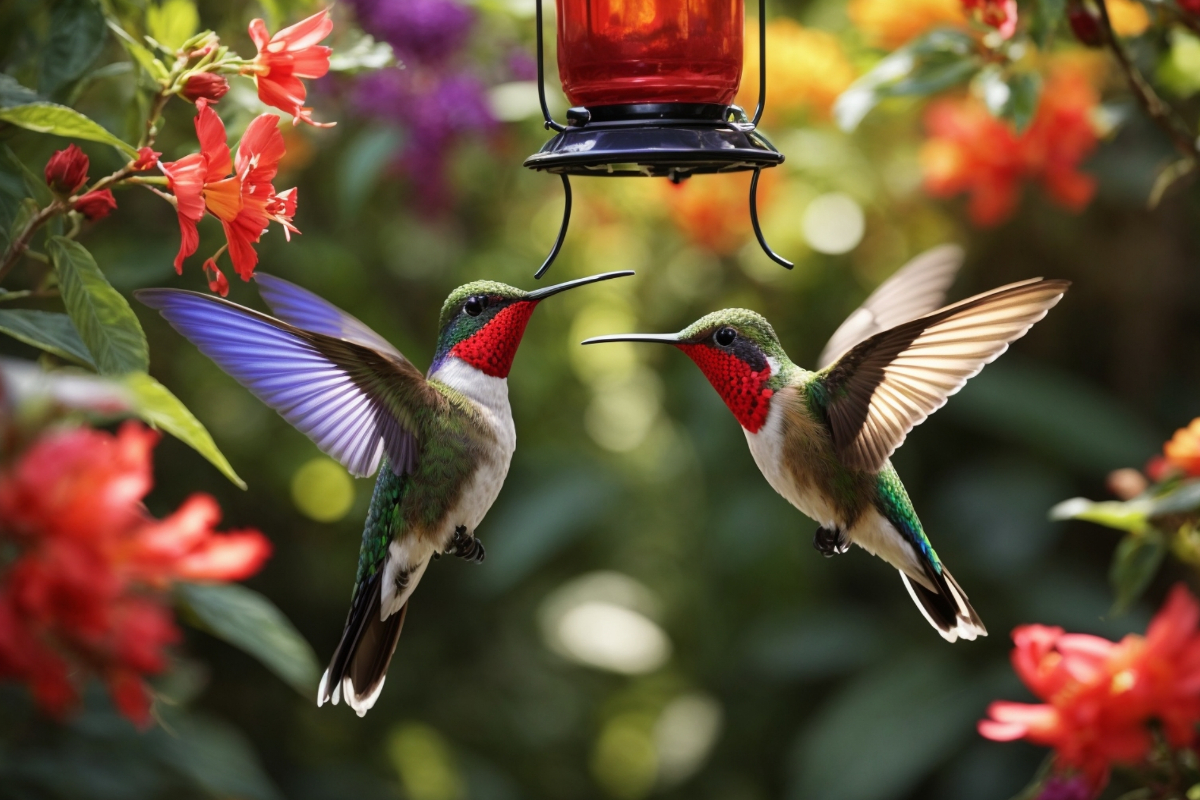In this blog post, we’re going to explore a fascinating aspect of hummingbird behavior: their territorial nature. But first, have you ever noticed a hummingbird fiercely chasing others away from a feeder or a flower? It’s a common sight, but what drives this feisty behavior?
Key Takeaways:
- Hummingbirds are known for being territorial, especially during feeding.
- They defend resources like food sources and nesting sites vigorously.
- This behavior is more pronounced in males and during breeding season.
- Understanding this aspect of hummingbird behavior can enhance bird-watching experiences.
Are Hummingbirds Territorial?
Yes, hummingbirds are territorial. They exhibit this behavior to ensure access to essential resources such as food and nesting sites. Male hummingbirds are particularly territorial during the breeding season as they compete to attract mates by defending areas rich in nectar.
Females also show territoriality, especially when safeguarding their nests. Territorial actions include chasing away other hummingbirds, performing aggressive aerial displays, and vocalizations. This behavior, vital for their survival, varies among species and individuals in intensity and frequency.
For instance, the Ruby-throated and Rufous species are known to be the most territorial birds.
- Key Takeaways:
- Are Hummingbirds Territorial?
- Why Are Hummingbirds Territorial?
- When Do Hummingbirds Get Territorial?
- The Territorial Dance of Hummingbirds
- Observing and Respecting Their Space
- Are Female Hummingbirds Territorial?
- Are Hummingbirds Territorial Over Feeders?
- Are Hummingbirds Territorial Over Nectar Flowers?
- Are Hummingbirds Territorial Towards Humans?
- Do Hummingbirds Display Aggressive Behaviors Towards Other Bird Species?
- How Do Hummingbirds Protect Themselves?
- How Do You Stop Hummingbirds From Fighting Over Feeders?
- Conclusion
- Frequently Asked Questions (FAQs) – Are Hummingbirds Territorial?
- Useful Links:
Related post to read: The Secret Lives of Hummingbirds
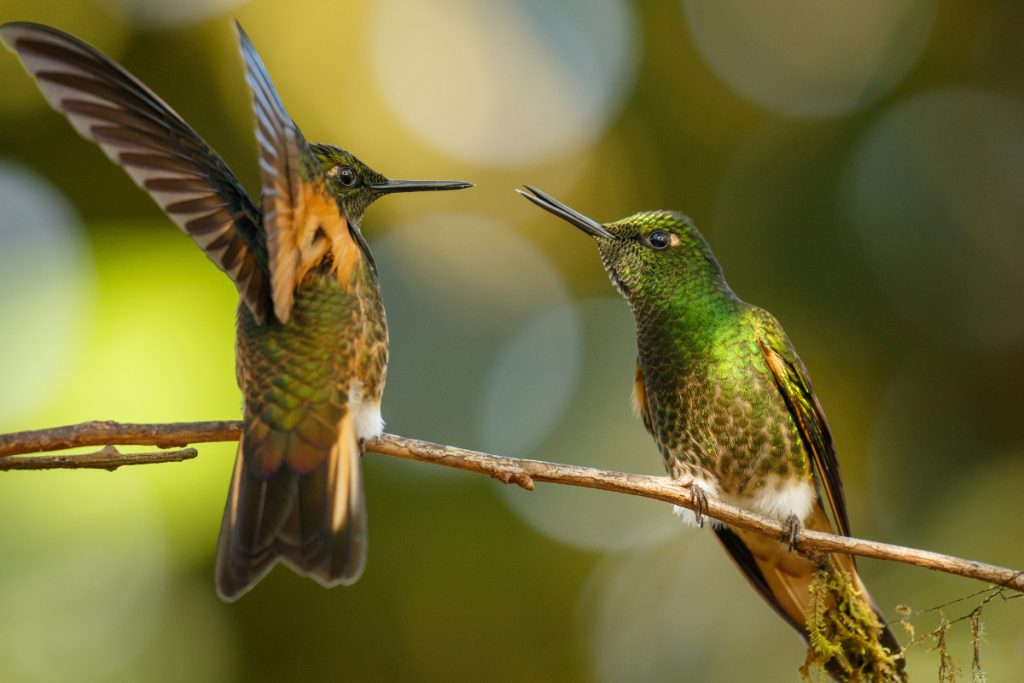
Why Are Hummingbirds Territorial?
Hummingbirds exhibit territorial behavior primarily as a survival mechanism. The main reasons for their territoriality are:
- Resource Protection: Hummingbirds have high metabolic rates and need to feed frequently. By defending territories with rich food sources, they ensure consistent access to nectar.
- Mating and Breeding: Males often guard territories to attract females for mating. A well-maintained territory signifies a healthy and strong male, appealing to potential mates.
- Nesting Sites: Females can be territorial about nesting sites. A secure area increases the chances of their young surviving.
Territorial behaviors include chasing, aerial displays, and aggressive calls. These actions are vital for their survival, ensuring they have enough food and a safe place for raising their young.
Now, let’s take a closer look at this intriguing behavior.
Related post to read about Best Hummingbird Feeders.
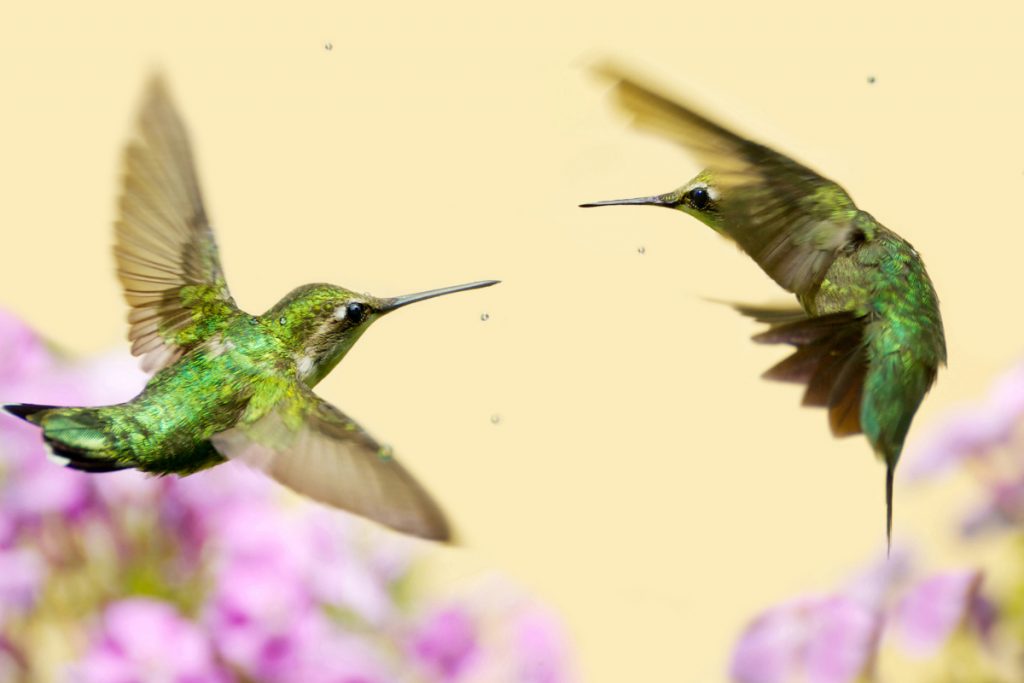
When Do Hummingbirds Get Territorial?
While the territorial nature of hummingbirds is a well-established behavior, it’s particularly pronounced during specific times and conditions. The peak of their territoriality aligns with the breeding season.
During this period, which varies depending on the species and geographical location, male hummingbirds aggressively defend areas rich in nectar to attract potential mates. This behavior is crucial for mating success and is often accompanied by dazzling aerial displays and vocal confrontations.
Outside the breeding season, their territorial behavior can still be observed but is usually less intense. It’s primarily driven by the need to secure reliable food sources. Hummingbirds are known to fiercely guard feeders or flower patches, ensuring a steady supply of nectar to maintain their high metabolism.
Understanding these seasonal variations in territorial behavior offers a glimpse into the fascinating life cycle of these vibrant birds and enhances our appreciation of their presence in our gardens and natural spaces.
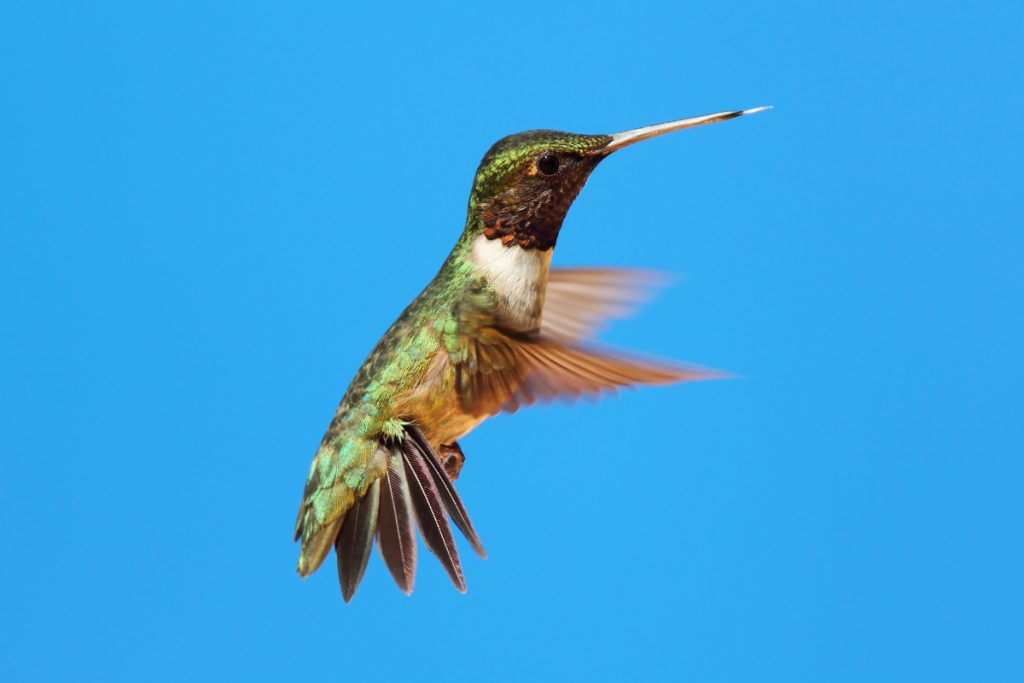
The Territorial Dance of Hummingbirds
The territoriality of hummingbirds is often a mesmerizing display. Males, in particular, engage in intricate flight patterns and high-speed chases to ward off intruders. These displays serve as both a warning and a show of strength.
Interestingly, this behavior varies among species and individual birds. Some are more aggressive, while others adopt a more laid-back approach to defending their turf.
Observing and Respecting Their Space
For birdwatchers and nature enthusiasts, understanding this aspect of hummingbird behavior is crucial. While it’s tempting to attract as many hummingbirds as possible, overcrowding can lead to excessive territorial disputes. Here are a few tips:
- Spread Out Feeders: Placing feeders far apart from each other can reduce conflicts.
- Plant Diverse Flowers: A garden with a variety of flowers can cater to more hummingbirds without triggering their territorial instincts.
- Observation: Watch these interactions from a distance to avoid disturbing their natural behavior.
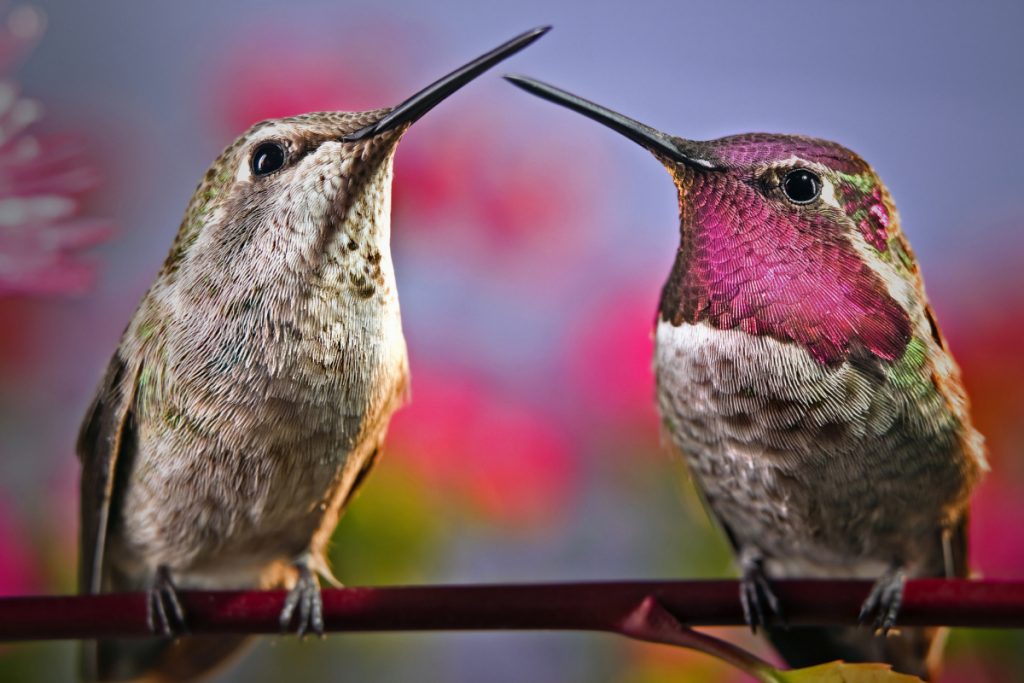
Are Female Hummingbirds Territorial?
Yes, female hummingbirds can be territorial, particularly when it comes to protecting their nesting sites. While they may not be as aggressively territorial as males, who often guard feeding territories to attract mates, females actively defend the areas around their nests. This behavior is essential for ensuring the safety of their eggs and chicks from potential threats and disturbances.
Are Hummingbirds Territorial Over Feeders?
Yes, hummingbirds are territorial over feeders. They often view feeders as valuable food sources and will vigorously defend them from other hummingbirds. This behavior involves chasing away intruders and sometimes engaging in aerial displays to establish dominance over the feeder area. While both males and females can show this territorial behavior, it is more commonly observed in males, especially during the breeding season when competition for resources is high.
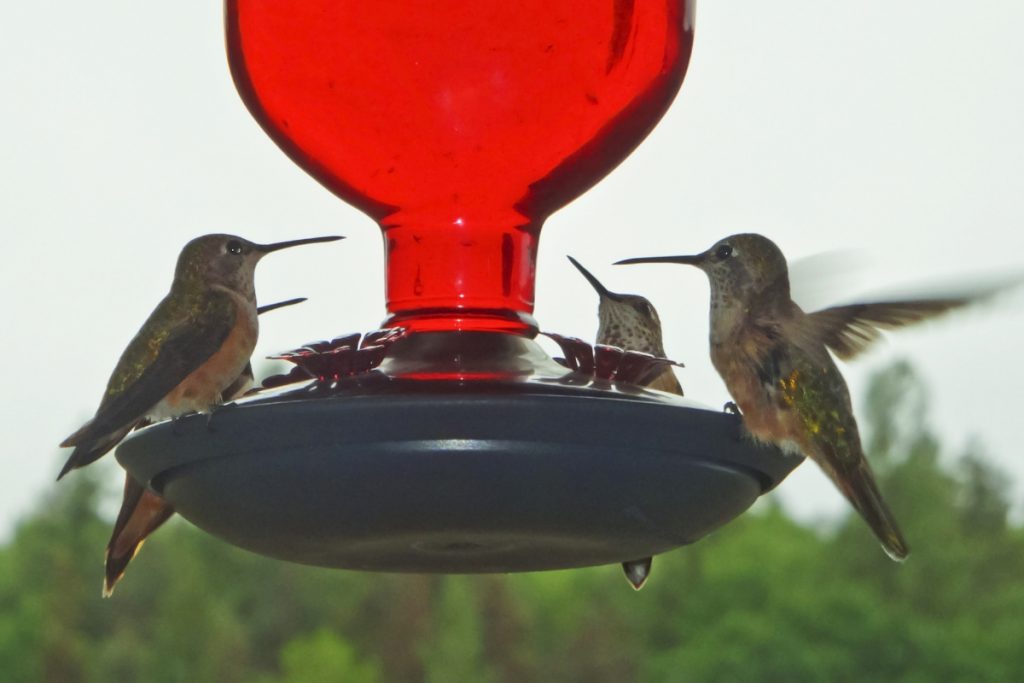
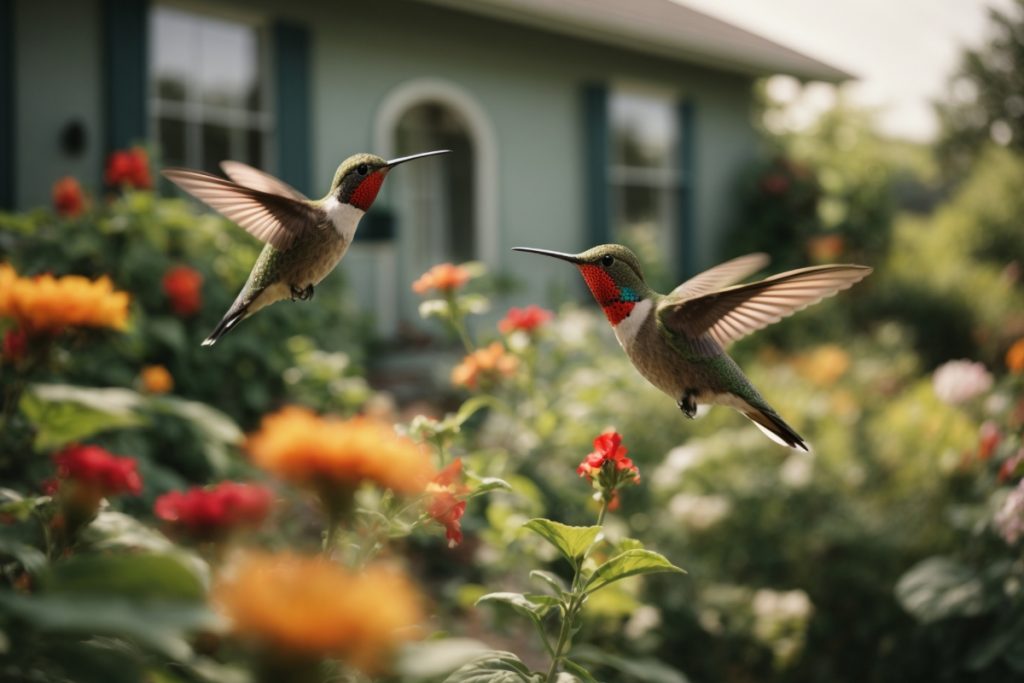
Are Hummingbirds Territorial Over Nectar Flowers?
Yes, hummingbirds exhibit territorial behavior over nectar flowers. They often guard areas rich in nectar-producing flowers to maintain exclusive feeding rights. This territoriality ensures a steady nectar supply, crucial for their high-energy lifestyle. Their defense tactics include aggressive chases and aerial displays to deter other hummingbirds from accessing these flowers. This behavior is particularly evident during peak feeding times and breeding seasons.
Are Hummingbirds Territorial Towards Humans?
Hummingbirds are generally not territorial towards humans. Their territorial behavior is typically directed at other hummingbirds or sometimes at small animals that they perceive as threats to their food sources or nests. While they may display curiosity or boldness around humans, especially in areas where they are accustomed to human presence, hummingbirds do not exhibit the same aggressive territorial behaviors towards people as they do towards other birds.
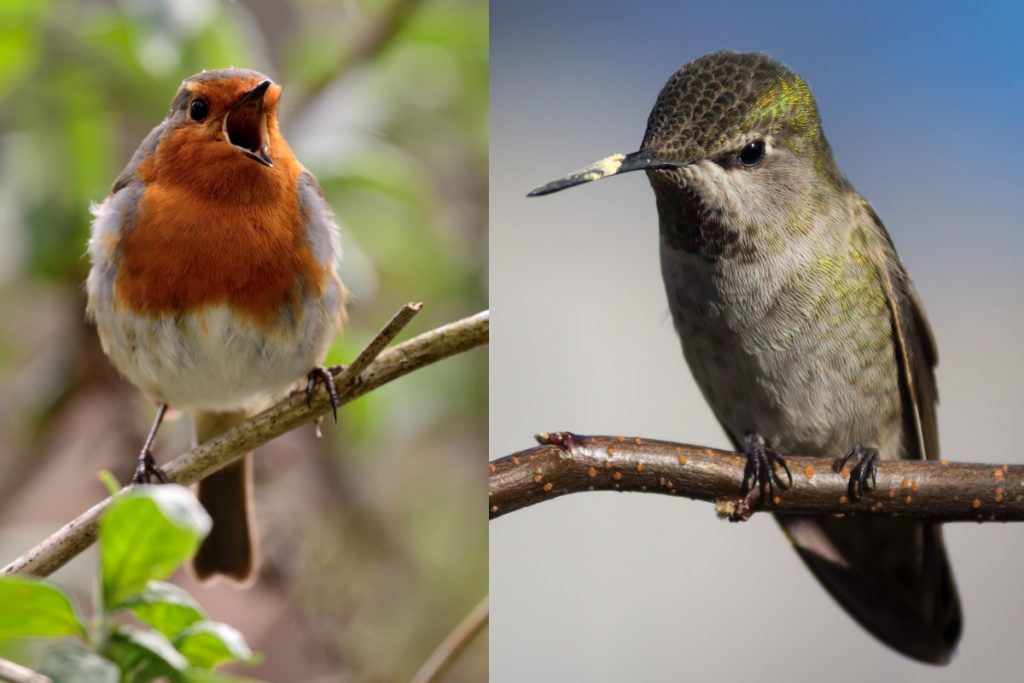
Do Hummingbirds Display Aggressive Behaviors Towards Other Bird Species?
Hummingbirds can exhibit aggressive behavior towards other bird species, particularly when defending their feeding territories. They are known to chase and confront larger birds that enter areas with food sources like nectar feeders or flower gardens. This assertive behavior is a protective mechanism to maintain access to vital food resources and is not indicative of general hostility towards other birds. The intensity of this behavior varies among individual hummingbirds and is influenced by factors such as the availability of food and the breeding season.
How Do Hummingbirds Protect Themselves?
Hummingbirds protect themselves using several strategies. Their small size and agility in flight allow them to quickly escape predators. They also use their rapid wingbeats to create a humming sound that can deter some predators.
In addition, hummingbirds exhibit territorial behavior, aggressively defending their feeding areas and nests from intruders, including other birds and small animals. Their sharp beaks and fast maneuvers are effective tools in these confrontations. Additionally, they often choose nesting sites that are hidden or difficult to access, adding another layer of protection for their young.
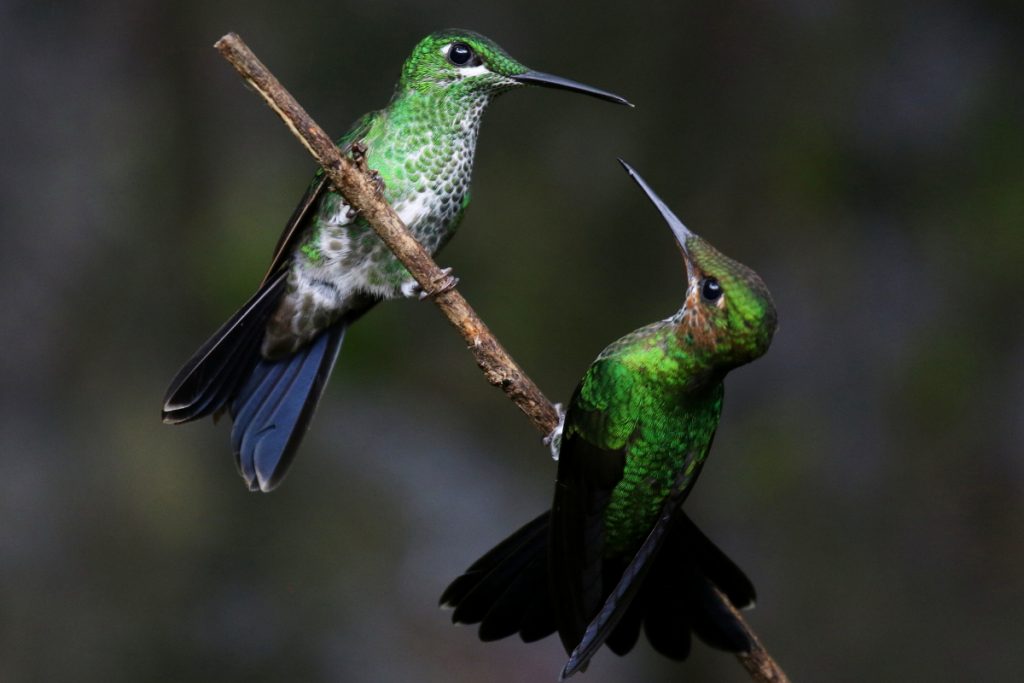
How Do You Stop Hummingbirds From Fighting Over Feeders?
To prevent hummingbirds from fighting over feeders, implement these steps:
- Multiple Feeders: Place several feeders out of sight from each other. This reduces competition, as one bird cannot guard multiple feeders at once.
- Strategic Placement: Space the feeders throughout your yard to create separate feeding zones.
- Diverse Feeding Options: Introduce a variety of nectar plants in your garden. Natural food sources can reduce dependence on feeders and lower aggression.
- Regular Maintenance: Keep feeders clean and filled with fresh nectar to ensure there’s enough food for multiple birds.
- Observe and Adjust: Monitor the hummingbirds’ behavior and adjust feeder placement as needed to reduce conflicts.
These strategies help create a peaceful feeding environment, minimizing aggressive encounters among hummingbirds.
Conclusion
So, are hummingbirds territorial? Absolutely, and for good reasons. This behavior is a testament to their survival instincts and a fascinating aspect of their natural history. The next time you see a hummingbird zipping through your garden, remember that you’re witnessing a small but mighty creature fiercely protecting its territory.
Experiencing the dynamic world of hummingbirds can be both thrilling and educational. By respecting their territorial nature, we can coexist with these beautiful birds and enjoy their presence in our gardens and wild spaces.
Now, Over To You!
Please feel free to leave a comment in the comment section below. I’d love to hear your opinion on this. And until next time, thanks for stopping by, and happy bird watching.
Frequently Asked Questions (FAQs) – Are Hummingbirds Territorial?
Q: Why are hummingbirds so territorial?
A: Hummingbirds are territorial primarily to secure vital resources like food (nectar) and nesting sites. This behavior ensures they have enough energy to sustain their high metabolism and a safe place for breeding.
Q: Can one feeder lead to more hummingbird fighting?
A: Yes, having only one feeder can increase the likelihood of fighting, as multiple hummingbirds may compete for the same food source.
Q: Are ruby-throated hummingbirds more aggressive than other species?
A: Ruby-throated hummingbirds, like many hummingbird species, can be territorial and aggressive, especially males during the breeding season. However, their level of aggression is comparable to that of many other hummingbird species.
Q: How can I prevent hummingbirds from fighting over the feeder?
A: To reduce fighting, place multiple feeders out of sight of each other and consider adding natural nectar sources like flowers to your garden.
Q: Do rufous hummingbirds show more territorial aggression than others?
A: Rufous hummingbirds are known for being particularly territorial and aggressive, often dominating feeder areas.
Q: What causes a dominant hummingbird to guard a feeder?
A: A dominant hummingbird guards a feeder to ensure continuous access to food, which is vital for maintaining its high energy needs.
Q: Why do some hummingbirds become bully hummingbirds at feeders?
A: Bully hummingbirds are typically dominant individuals who aggressively defend feeders to monopolize food sources.
Q: Are aggressive hummingbirds common at hummingbird feeders?
A: Yes, it’s common to observe aggressive behavior at hummingbird feeders, especially in areas with a high concentration of these birds.
Q: Why are hummingbirds surprisingly aggressive despite their small size?
A: Despite their small size, hummingbirds are aggressive due to the intense competition for limited resources like nectar, essential for their survival.
Q: Can one male hummingbird dominate a feeder?
A: Yes, one male hummingbird can dominate a feeder, often chasing away others to control the food source.
Q: How do hummingbirds establish territories around feeders?
A: Hummingbirds establish territories by frequently visiting and chasing away other birds from a feeder, asserting dominance over that area.
Q: Do hummingbirds use different strategies for feeding at different feeders?
A: Hummingbirds may use various strategies, such as timing their visits and choosing less crowded feeders to avoid confrontation.
Q: Why do some hummingbirds fight fiercely over flower nectar?
A: Flower nectar is a crucial food source for hummingbirds, leading to fierce competition and territorial behavior.
Q: How do hummingbirds protect their source of nectar?
A: Hummingbirds protect their nectar sources by engaging in aerial chases and displaying aggressive behaviors to ward off competitors.
Q: Are Anna’s hummingbirds more territorial than other species?
A: Anna’s hummingbirds can be territorial, but their level of territoriality is similar to that of other hummingbird species.
Q: Why do some birds won’t visit a feeder with a dominant hummingbird?
A: Some birds avoid feeders with a dominant hummingbird to escape aggressive interactions and potential injury.
Q: Do all species of hummingbirds exhibit territorial fighting?
A: Most species of hummingbirds display some level of territorial behavior, but the intensity and frequency can vary among species.
Q: Are hummingbirds highly territorial around their nests?
A: Yes, hummingbirds are highly territorial around their nests, particularly females who aggressively defend their nesting area.
Q: What causes territorial fighting among hummingbirds?
A: Territorial fighting among hummingbirds is typically triggered by competition for food sources and mating territories.
Q: How many hummingbirds can one feeder support without causing territorial disputes?
A: The number of birds a feeder can support without disputes varies, but territorial conflicts can be minimized by using multiple feeders spaced apart.
Useful Links:
Related Posts to Read:
- Do Hummingbirds Beaks Open When Feeding?
- The Mysteries of Hummingbird Flight.
- 6 Fascinating Facts About Hummingbird Sizes.
- Ruby-Throated Hummingbird Migration Map.
- Where Do Hummingbirds Go When It Rains?
- How Much Does A Hummingbird Eat Per Day?
- Hummingbird Diet and Nutrition
- Unveiling 25 Hummingbird Behaviors
References:
- About Hummingbird (Link).
- Greenewalt, C. H. (1960). Hummingbirds. New York: Doubleday. Google Scholar.
- Carey C. The impacts of climate change on the annual cycles of birds. Philos Trans R Soc Lond B Biol Sci. 2009 Nov 27; 364(1534):3321-30. doi: 10.1098/rstb.2009.0182. PMID: 19833644; PMCID: PMC2781852.
- Rico-Guevara A, Rubega MA, Hurme KJ, Dudley R. Shifting Paradigms in the Mechanics of Nectar Extraction and Hummingbird Bill Morphology. Integr Org Biol. 2019 Jan 2;1(1):oby006. doi: 10.1093/iob/oby006. PMID: 33791513; PMCID: PMC7671138.
- Tyrrell LP, Goller B, Moore BA, Altshuler DL, Fernández-Juricic E. The Orientation of Visual Space from the Perspective of Hummingbirds. Front Neurosci. 2018 Jan 30;12:16. doi: 10.3389/fnins.2018.00016. PMID: 29440985; PMCID: PMC5797624.
- Hummingbirds Sighting (Journey North Map).
- About Hummingbird’s Characteristics.
